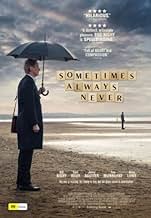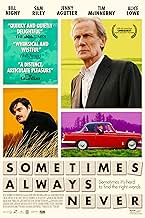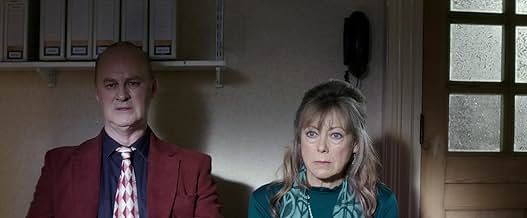IMDb RATING
6.3/10
3.5K
YOUR RATING
A detective fantasy / family drama where a love of words helps a father reconnect with a missing son.A detective fantasy / family drama where a love of words helps a father reconnect with a missing son.A detective fantasy / family drama where a love of words helps a father reconnect with a missing son.
- Awards
- 1 win total
- Director
- Writer
- All cast & crew
- Production, box office & more at IMDbPro
Featured reviews
If it wasn't for the presence of mobile phones and computer games you'd think that this was set in the 60's ! Bill Nighy is sparsely twinkly, just enough to make me stay in my seat for the entire film. A good cast, an intriguing storyline, almost a period piece.
I think Bill must have it in his contract for every piece he does to wear a good coat. (Apart from Dads Army).
A single delicious narrative conceit drives the delightful Sometimes. Always. Never. (2018). It takes its own sweet time getting there, but when it does, it hits home: you can be an expert in words and their rules but be incapable of meaningful expression. Add a Scrabble obsession, mix it with deep grief and guilt, and you have a portrait of a family desperately unable to communicate with each other.
The simplicity of the plotline stands in stark contrast to the complexity of its themes. Dapper rule-bound tailor Alan (Bill Nighy) is told that the body of his long-missing son Michael may have been found. He takes his younger estranged son Peter (Sam Riley) with him to identify the body, and at the morgue they meet other parents who are there for the same reason. It's a diversion that does little to advance the narrative, but it does provide comic respite from the pain of loss. Both relieved and disappointed with the outcome, Alan invites himself to stay with Peter and his family in the hope of reconciliation.
With a threadbare plot, the power of this film comes from its theatrical settings, intelligent banter, and Nighy's trademark whimsical mannerisms and stylised performance. The label 'fantasy drama' has been applied to this film but is mis-leading and manifestly inadequate. If there is an element of fantasy, it derives from the way many scenes are played out against backgrounds that are have a surreal, even an absurdist two-dimensional feel that resembles a theatre set. Like all absurdism, there is an artful space between the underlying emotional intensity and the futility of ever trying to understand it. The gravelly Nighy is a master of under-statement, with a unique talent for giving shallow dialogue depth and humour. It's all about contrasts: Alan's obsession with a missing son and neglect of the son he still has; his fastidious Dymo labelling of everything as a substitute for control in his world; and his ability to make light of the heaviest emotions.
If you are not a Nighy fan or prefer action-based stories, you may find little to appreciate in this film. In place of a forward-moving narrative it offers a portrait of a dysfunctional family torn apart over guilt and the inability to emotionally connect. The film's title is itself a parody of form over function, referring to the tailor's rule for how jacket buttons should be fastened: the top always, the middle sometimes, the bottom never. With no substantive relationship to the film's content, it's a rule as good as any on how to live one's life.
The simplicity of the plotline stands in stark contrast to the complexity of its themes. Dapper rule-bound tailor Alan (Bill Nighy) is told that the body of his long-missing son Michael may have been found. He takes his younger estranged son Peter (Sam Riley) with him to identify the body, and at the morgue they meet other parents who are there for the same reason. It's a diversion that does little to advance the narrative, but it does provide comic respite from the pain of loss. Both relieved and disappointed with the outcome, Alan invites himself to stay with Peter and his family in the hope of reconciliation.
With a threadbare plot, the power of this film comes from its theatrical settings, intelligent banter, and Nighy's trademark whimsical mannerisms and stylised performance. The label 'fantasy drama' has been applied to this film but is mis-leading and manifestly inadequate. If there is an element of fantasy, it derives from the way many scenes are played out against backgrounds that are have a surreal, even an absurdist two-dimensional feel that resembles a theatre set. Like all absurdism, there is an artful space between the underlying emotional intensity and the futility of ever trying to understand it. The gravelly Nighy is a master of under-statement, with a unique talent for giving shallow dialogue depth and humour. It's all about contrasts: Alan's obsession with a missing son and neglect of the son he still has; his fastidious Dymo labelling of everything as a substitute for control in his world; and his ability to make light of the heaviest emotions.
If you are not a Nighy fan or prefer action-based stories, you may find little to appreciate in this film. In place of a forward-moving narrative it offers a portrait of a dysfunctional family torn apart over guilt and the inability to emotionally connect. The film's title is itself a parody of form over function, referring to the tailor's rule for how jacket buttons should be fastened: the top always, the middle sometimes, the bottom never. With no substantive relationship to the film's content, it's a rule as good as any on how to live one's life.
First off, the catchy title is simply a reference to guidance wearing a 3-button suit coat, sometimes the top button, always the middle button, never the bottom button. The main character is a tailor, he gives the advice to his teen grandson
Bill Nighy is Alan, Scrabble fan with two adult sons, and a teen grandson. One son, Michael, is missing, apparently he got up from a Scrabble game and left, they never heard from him again.
Several times the script references the Biblical prodigal son story, the one son who remained connected feels he isn't getting the love he deserves and all dad cares about is finding the missing son.
The story is a family relationship drama but sprinkled with humor. Bill Nighy makes it a worthwhile movie, all the other characters could have been played by almost anyone. However it was also good to see Jenny Agutter in a small role, she was mid-60s during filming, who could forget her performance in "Walkabout" when she was still a teenager?
I watched this on Amazon streaming movies.
Bill Nighy is Alan, Scrabble fan with two adult sons, and a teen grandson. One son, Michael, is missing, apparently he got up from a Scrabble game and left, they never heard from him again.
Several times the script references the Biblical prodigal son story, the one son who remained connected feels he isn't getting the love he deserves and all dad cares about is finding the missing son.
The story is a family relationship drama but sprinkled with humor. Bill Nighy makes it a worthwhile movie, all the other characters could have been played by almost anyone. However it was also good to see Jenny Agutter in a small role, she was mid-60s during filming, who could forget her performance in "Walkabout" when she was still a teenager?
I watched this on Amazon streaming movies.
I loved the movie. Bill Nighy is superb in anything he does, the rest of the cast were wonderful. It was written with humour, wittiness with a hint of sadness.
It is a joy to watch it. First, because of its style of shooting and second, because of its clear and rich colors. It looks as an brilliant school of art, designed precisely. On the other hand it is a good story, done in some traditional and emotional way, and who is playing in. Bill Nighy is as always excellent, elegant and charming.
Did you know
- TriviaThe film is based on a short story called Triple Word Score, written by the script writer Frank Cottrrel Boyce.
- GoofsWhen Alan claims that "jazz" is a high-scoring word in Scrabble, a character corrects him by stating it's impossible to play since there's only one Z tile in the set. In reality, this word is indeed playable using "wild card" tiles. If using J, A, and Z tiles and a wild card tile in place of the other Z, the word would be a high-scoring word worth a minimum of 19 points.
- ConnectionsFeatured in Projector: Sometimes Always Never (2019)
- SoundtracksSometimes Always Never
Written by Edwyn Collins and Sean Read
Performed by Edwyn Collins, Sean Read and Chay Heney
- How long is Sometimes Always Never?Powered by Alexa
Details
- Release date
- Countries of origin
- Official site
- Language
- Also known as
- Triple Word Score
- Filming locations
- Crosby Beach, Crosby, Liverpool, Merseyside, England, UK(seaside scenes)
- Production companies
- See more company credits at IMDbPro
Box office
- Gross US & Canada
- $39,191
- Opening weekend US & Canada
- $2,599
- Jun 14, 2020
- Gross worldwide
- $1,417,047
- Runtime1 hour 31 minutes
- Color
- Aspect ratio
- 2.35 : 1
Contribute to this page
Suggest an edit or add missing content

Top Gap
By what name was Sometimes Always Never (2018) officially released in India in English?
Answer






























